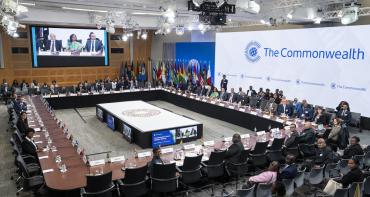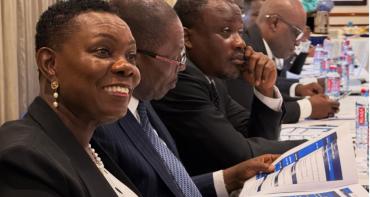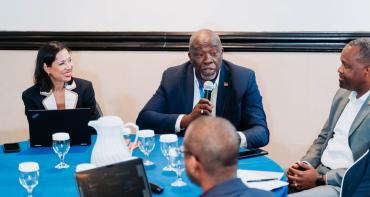Nobel prize-winning economist Professor Joseph Stiglitz has called for an enshrining of a ‘Right to Trade’ in the global trading regime, as a new initiative to help the trade performances of the world’s poorest and most vulnerable economies.
The Columbia University don, who is also founder of the Initiative for Policy Dialogue, a think tank on international development based at Columbia University, said this mechanism would enable developing countries and groups of communities to bring legal action to the World Trade Organization (WTO) against advanced countries whose policies materially impact their development by restricting their ability to trade.
In a draft report for the Commonwealth Secretariat, the lead author Professor Stiglitz also proposed the establishment of a Global Trade Facility fund to assist developing countries with their supply side capacity. The proposal contains the fund with contributions from all donors to be managed by UNCTAD.
The Facility would provide resources to support developing countries' genuine need in Aid for Trade and compensate for any losses from unfair policies and trade-related adjustment costs.
Speaking at a Commonwealth roundtable discussion on Aid for Trade at Marlborough House, headquarters of the Commonwealth Secretariat in London, UK, on 29 August 2012, Professor Stiglitz said so far Aid for Trade has not delivered on its promise.
Contrary to what was envisaged, Aid for Trade has not proved to be additional, predictable and effective. However, he acknowledged some positive effects on trade facilitation.
Professor Stiglitz said that without additionality, Aid for Trade is just another form of conditionality, and may actually impair the overall effectiveness of assistance programmes, becoming a substitute for meaningful reform of the global trading system.
As part of a pro-development multilateral liberalisation agenda, Professor Stiglitz said it is imperative to install alternative mechanisms to rebalance the global trading system and make trade work for the poor. He proposes that members of the WTO should adopt a general Right to Trade policy operating within the dispute settlement body.
Under such a mechanism, developing countries would be able to bring an action against any developed country and access remedies.
“A developing country (or countries) bringing successful actions under the Right to Trade could access a range of remedies, including elimination or change to the offending policy as a result of mediation, bilateral sanctions, and compensation from a multilateral Aid for Trade fund,” he said.
“Under this arrangement, developing countries should be able to club together to impose joint sanctions where they have been affected by actions of policies of a developed country.”
He also suggested that under the Right to Trade arrangement, a group of individuals or civil society organisations harmed by trade policies of another country should have the right and be able to bring a case before the WTO.
To complement the Right to Trade, Professor Stiglitz has proposed the creation of a Global Trade Facility - a dedicated fund established at the global level, to which all donors would contribute resources to be allocated to developing countries based on their needs.
The Global Trade Facility would provide resources to support developing countries' actions under the dispute settlement system and fund genuine Aid for Trade, assisting countries to maximise the benefits of new market access won through the dispute settlement system.
The Facility could also compensate developing countries for any losses - such as reduced aid or other retaliation - associated with any Right to Trade dispute.
It would also provide some adjustment and ongoing support to third party developing countries that may be negatively impacted as a result of changes to advanced countries' trade policies, for example where a developing country was receiving preferences whose value is eroded by liberalisation emanating from a Right to Trade case.
Earlier, the Director of Economic Affairs at the Commonwealth Secretariat, Dr Cyrus Rustomjee, said the Commonwealth - an association of 54 countries - seeks to help improve the trade performance of developing countries, particularly the least developed, small and vulnerable economies.
Dr Rustomjee said the subject of Aid for Trade had become a priority for the Commonwealth immediately after the issue was formally discussed by WTO members at the Hong Kong Ministerial Conference in 2005. He said the Commonwealth Secretariat has since focused its work on helping its most vulnerable members to secure Aid for Trade resources, and also conducted studies to understand the effectiveness and impact of Aid for Trade in achieving sustainable development goals.
Attending the roundtable meeting were Geneva-based ambassadors, including Wayne McCook of Jamaica, Faizel Ismail of South Africa and Anthony Maruping of Lesotho. Professor L Alan Winters of Sussex University and Dr Richard Kozul-Wright of UNCTAD also shared their views.
The panellists at the roundtable said the proposals were "radical", "progressive", "mischievous" and "interesting but risky". They added that more work needed to be done to tease out details of how these would work and be enforced. There was consensus on the need for more work to address other barriers to trade, including the lowering of tariffs, improving infrastructure, capacity, market access and affordability, standards and competitiveness, access to credit and addressing the politics of trade.



